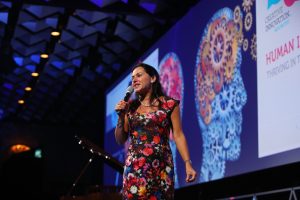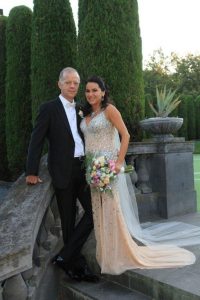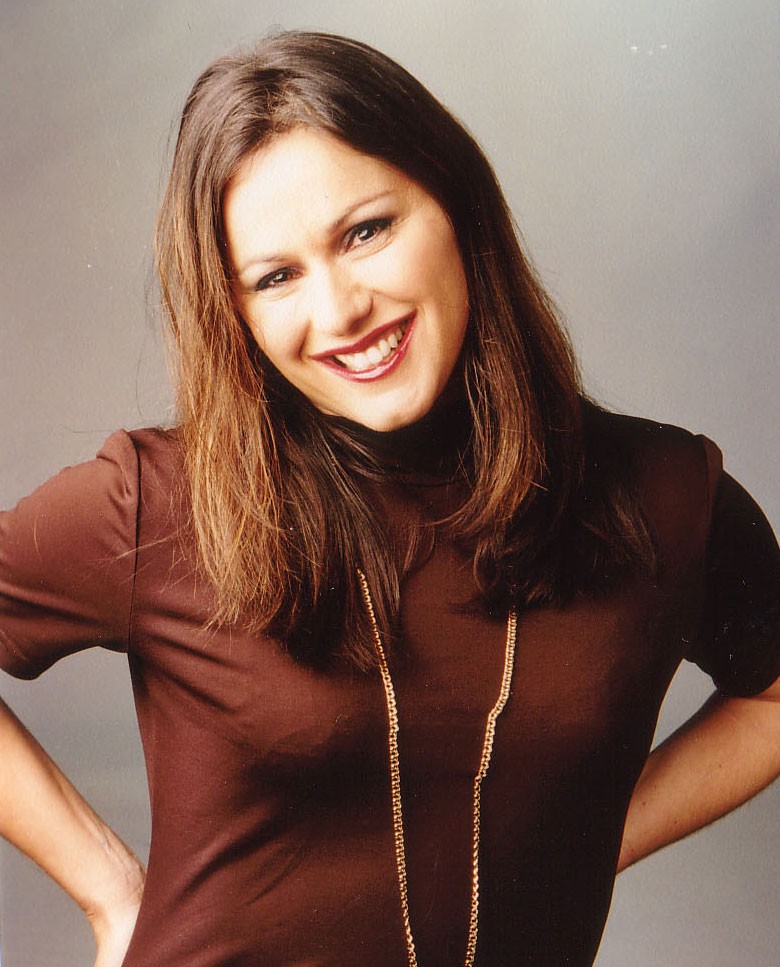
After her first encounter with plant medicines, Tania de Jong decided to devote her life to making them accessible and affordable to those who are suffering from mental illness.
As far as model citizens go, Tania de Jong provides a blueprint that’s about as pristine as one can get.
Over the past two decades, she’s founded seven companies and three charities. She’s a Member of the Order of Australia and in 2018 was named both one of the country’s 100 Most Influential Entrepreneurs and in the top 100 Women of Influence. She’s also a sought after speaker and a world-class soprano, performing as a soloist and as part of a group that’s released 10 albums.
This last pursuit Tania has even managed to mold into the focus of social inclusion program, With One Voice. As well as bringing people from different backgrounds together through the experience of singing in a choir, the movement also has the aim of helping participants find their voice — both literally and figuratively. In a 2013 TEDx talk showcasing the initiative, she spoke with fervor about her life’s mission to set people free from the “boxes” of their lives.
“I have a theory of boxes,” she explains in the recording. “We get born into a little bassinet box and then we go home, which looks like a box. We go to school and we often get taught to think in the box. We go to work and we have a box in our pocket, our mobile phone, and we have a screen in front of us, which is our computer box. We have to tick the box an awful lot and when we go out of this world, we go out in a box.”
If you’re a relatively ordinary person and reading about all of this achievement is just as exhausting as it is writing it… to top it all off, in her personal life, Tania has never smoked, taken drugs, or experienced being drunk.
“I don’t even drink coffee. I bet I sound like a really boring person,” she laughed over the phone from Melbourne. “I’d just never really felt like I needed other substances to enhance my life.”
So when the realization dawned on Tania just a handful of years ago that she wanted to dabble in psychedelics, the surprise struck her hard.
Tania’s talk from TEDx Melbourne
Going From Sober to Psilocybin Seeker
Having read a Michael Pollan article on the back of catching a Tim Ferriss recommendation, Tania’s interest in trying psilocybin began to grow. It was a plot twist that “had something to do with the fact that I’d never been out of control,” she said. “There was a sense of wanting to be out of control for the first time in my life. Also for physical issues I have, which are probably caused by whatever trauma is being carried in my body.”
Recruiting support from Peter Hunt, her partner at the time (and now husband), the two set about trying to get into multiple trials happening globally at the time. When that didn’t pan out, they were eventually referred to a private therapist in the Netherlands, where the use of psychoactive truffles is legal.
“I was incredibly nervous before I did it because I’d never been drunk or tried anything before. So I was definitely worried I was going to destroy my brain or something ridiculous,” Tania said.
In a therapeutic setting, Tania and Peter ingested a large dose of psilohuasca — a combination of psilocin-containing fungi and Syrian Rue, an MAO inhibitor used to enhance and prolong the effects of a trip.
From that point, Tania’s life veered off in a direction she could never have imagined.
“It completely shot us into space… The doors of perception were well and truly opened,” she quipped, a smile in her voice, before softening. “It was one of the most meaningful experiences of our lives.”
Inner Journeying
Even for someone as articulate as Tania, describing her first encounter with plant medicine proved, at times, a struggle to wrangle into words that everyone can relate to.
“There was just an incredible sense that everything is in me and I’m in everything. All the boundaries dissolved and there was just the magnificence of the planet, the plants, the animals…” She trailed off, then added with a burst of mirth, “You know, I’ve never been able to kill a cockroach since then! I can’t even step on an ant anymore.”
Cautious footsteps and newfound connection to nature aside, it was the connection to herself that netted some of the deepest understandings. Born Jewish, insights Tania gained in that first session and those following have helped her confront transgenerational trauma she’s lived with her whole life.
“What’s going on epigenetically in my DNA has come up for me a lot in the medicine trips,” she said. “I have these traumatic memories of the Holocaust even though I wasn’t personally there. Many of my relatives were killed. I’ve been able to heal a lot of that.”
Boosts to creativity were also on the list of benefits Tania continued to rattle off, having noticed more moments of “flow” and “purity” in her singing. A considerable lift in her energy levels was also welcomed, despite having “always been a really energetic person.” Tania also believes she’s “become more and more intelligent since I first took the medicine. I feel a lot of neural pathways have reconnected for me and a lot of new ones have been formed. It’s like all these missing parts of myself were found.”
 Tania with husband, Peter, on their wedding day, shortly after taking their first psilohuasca trip together
Tania with husband, Peter, on their wedding day, shortly after taking their first psilohuasca trip together
While much of this can be chalked up to the experience itself, Tania credits much of her positive experience to the self-development she dove into following that first overseas expedition. While the psychedelic experience has been shown to significantly decrease activity in the brain’s default mode network and introduce entropy during the trip itself, it’s the work that’s achieved in subsequent integration that leads to lasting wisdom. It’s a stage Tania referred to as “joining the dots.” In her and Peter’s case, this part of the process took a considerable amount of time.
“It was such a powerful experience, we didn’t have another for a whole year,” she explained. “It takes time for the inner work to be done — the integration of the experience.”
Fast-forward a few years later, and the couple now seeks out a session every six months.
“We call it our reset button. Every single time we work with these medicines, the experience is different. We get new insights and we heal a little more.”
Creating A(nother) Movement, Making a Real Difference
As much as the inner workings of her psyche underwent a significant reshuffle, it was just the beginning of the radical change the rest of Tania’s life was about to undergo.
“Once we had the experience, we thought if this has affected us this much, imagine if these medicines could heal hundreds of millions of people,” she recalled. “Certainly in Australia, there are well over five or six million suffering from mental illness right now.”
Recognising Australia was “way behind” in its psychedelic research and advocacy efforts, Tania and Peter began their own investigation of the plant medicine space, connecting with scientists and researchers overseas. She said while there are wonderful volunteer-based groups like the Australian Psychedelic Society and Entheogenisis Australis “there were no professional organisations only focused on making these medicines available in a therapeutic setting. We’re not saying that recreational use is bad or anything like that, not at all,” Tania clarified. “But we thought if there’s any way that we could help to make these medicines accessible and affordable to people suffering from a mental illness, that would be an incredible gift.”
So far, progress has been much more than promising. Last year, Tania and Peter joined philanthropic forces (at the time, both had previously established two charities a piece, separate from each other) to launch Mind Medicine Australia (MMA). Having just celebrated its first anniversary this month, the charity is making significant inroads towards achieving its mission of combatting mental illness with research-backed, psychedelic-assisted psychotherapy. It’s attracted support from major players in the psychedelic space, including pioneer Professor David Nutt, Head of Neuropsychopharmacology at Imperial College London. As well as planning a two-day international summit for this November — the first of its kind in Australia — MMA is also part-funding the nation’s first psychedelic clinical trial. Recently underway at Melbourne’s St Vincent’s Hospital, the study will look at the potential of psilocybin to treat end-of-life depression and anxiety.
A campaign video from Mind Medicine Australia
Tania’s grand view is to help everyone, “whatever their background, wherever they live,” overcome the conditions holding them back. In particular, she believes the potential to make a real dent in issues, like homelessness, is profound.
“At the heart of any kind of social isolation or disadvantage lies mental illness. That’s sitting there, and it’s keeping a person separate and alone — rigid thought structures and a feeling of despair and that things aren’t going to work out for them and usually a feeling of not being loved and whole,” Tania said. “Every day, we get emails and letters and calls from people who’ve tried every other type of medication and therapy, who are at the end of the road. There’s so much suffering and loneliness, it breaks my heart.”
Scaling the Mission to Set People Free
Essentially, that innate drive to set people free from boxes, the prisons they find themselves in, still sits at the core of Tania’s life’s work. The key to doing this, she hit home on the phone with an extra coating of passion, will be to introduce genuine connection back into people’s lives.
“We are social animals. We’re born to touch and feel and hold other human beings and to be with them in a significant way. By living our lives through screens and boxes, we lose that sense of true human connection, which is the most beautiful thing of all… The power of a human being to love and be loved. That is so profound.”
Today, Tania remains devoted to uncaging as many voices as possible through the healing capacity of song. There are many parallels between singing with others and psychedelics, she said, most notably the changes in brain chemistry induced by being in an altered state. But plant medicines represent an extremely effective new addition in her repertoire to ignite radical change. Further still, what legalisation will enable her, Peter and MMA to do is scale the mission in a way nobody could ever have dreamed of.
 Tania with one her great loves: Singing
Tania with one her great loves: Singing
“The case for these medicines in a medically-controlled, therapeutic environment is extremely strong. You’ve got remission rates between 60 and 80 percent, versus say 20 percent for normal medicines or therapy. Why wouldn’t we make these medicines available?” she asked. “One of our board members, Dr. Simon Longstaff, says it’s unethical to withhold them from people who are suffering.”
But it’s not solely the alleviation of suffering Tania is fixated on. With so many dire issues facing humanity and the environment, busting people out of boxes so they can face the power of their potential for perhaps the first time in their lives, she believes, should be a species imperative. The ability of plant medicines to facilitate one’s search for “a true sense of meaning and purpose” makes them an essential player in achieving such a lofty objective.
“We need to really mobilise and give everyone a sense of agency around their own healing and around what we need to do collectively. People need to feel like they have some sense of being able to contribute. None of us should doubt our individual capacity to help create change. Every single one of us is desperately needed in the world today.”
Mind Medicine Australia’s International Summit on Psychedelic Therapies for Mental Illness will be held on the 18 and 19 November at the Sofitel in Melbourne.
The #ThankYouPlantMedicine movement is organizing a huge viral campaign where people all over the world are encouraged to share their healing plant medicine stories online on February 20th, 2020 using the hashtag #thankyouplantmedicine.

* DISCLAIMER & IMPORTANT SAFETY MESSAGE
The #TYPM movement does not encourage any illegal use or abuse of plant medicines and psychedelics, whether cultivated in nature or lab synthesized.
Psychedelic and plant medicines, even within the confines of applicable laws, are not appropriate or beneficial for everyone. They are not magical cures but are tools that when used properly – with respect, clear intentions, guidance, and a safe, supportive environment – can catalyze personal growth and healing.
To minimize harm and increase therapeutic potential, it is imperative that one performs sufficient research, adequately prepares, and integrates their own experience.






This web site truly has all of the info I wanted about this subject and didn’t know who to ask. |